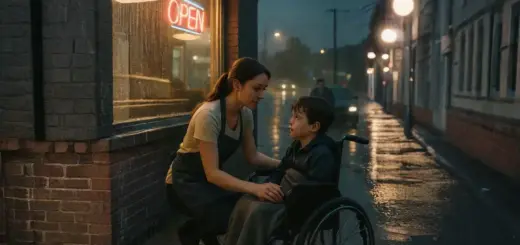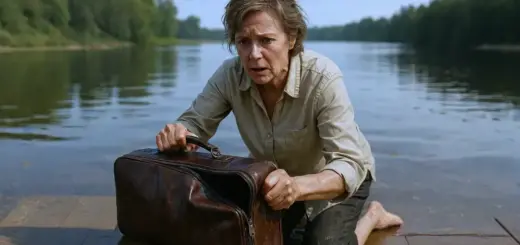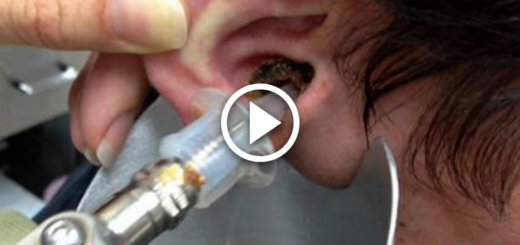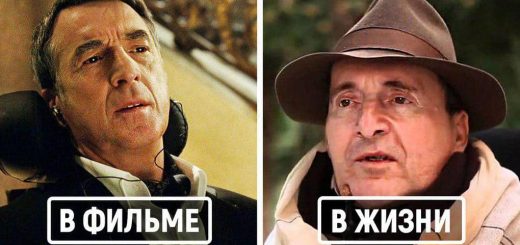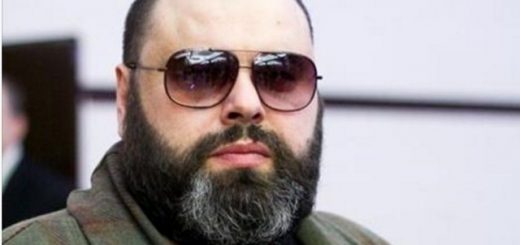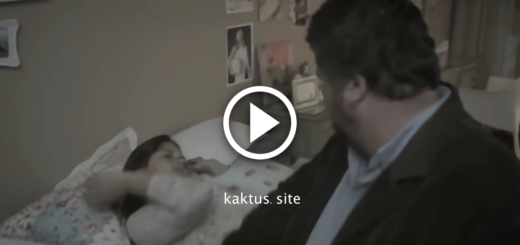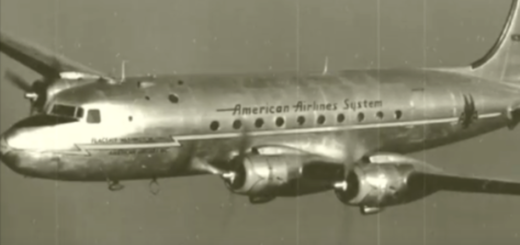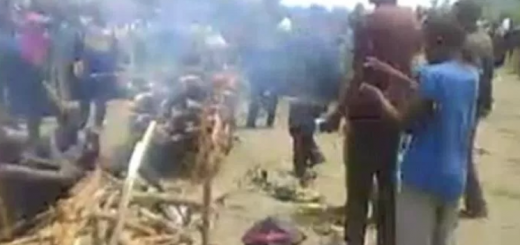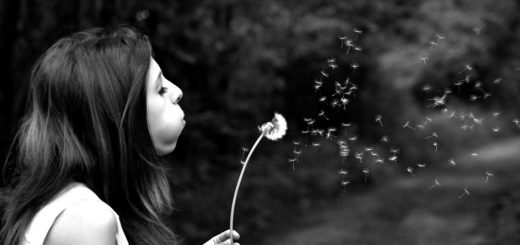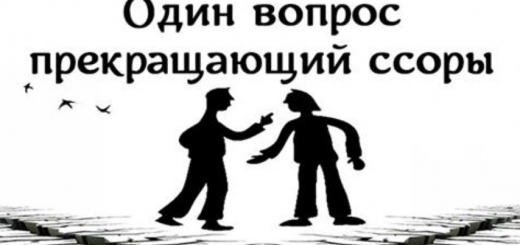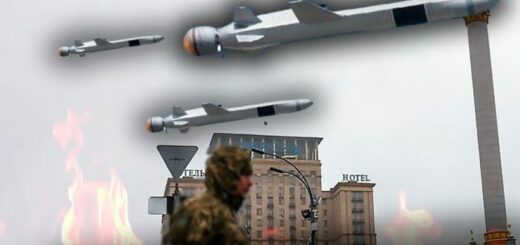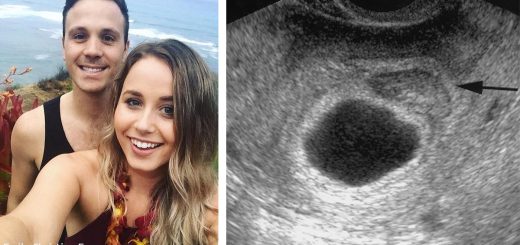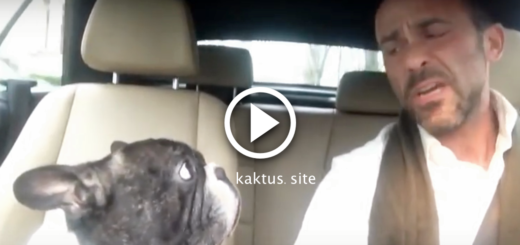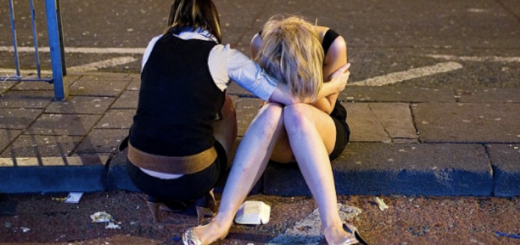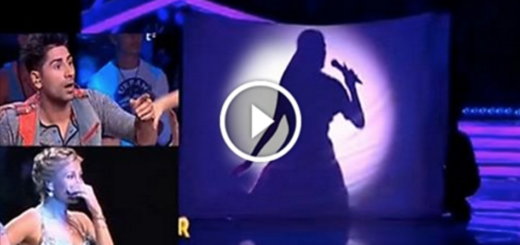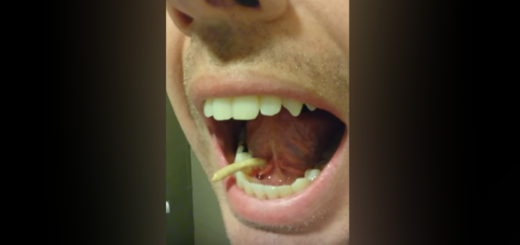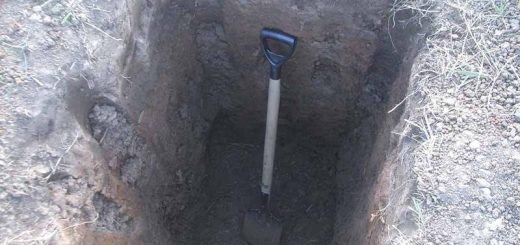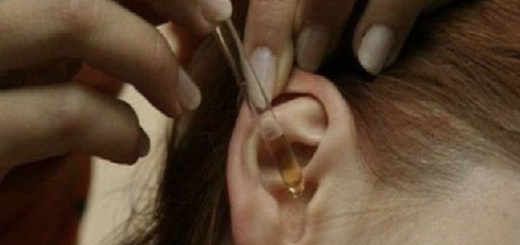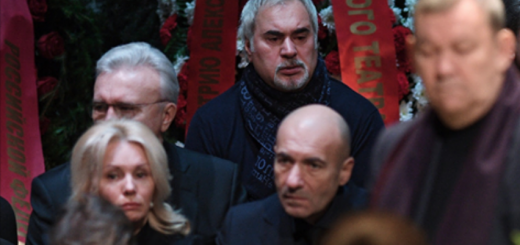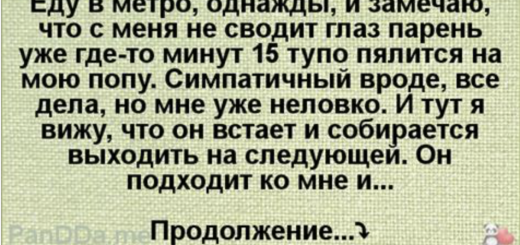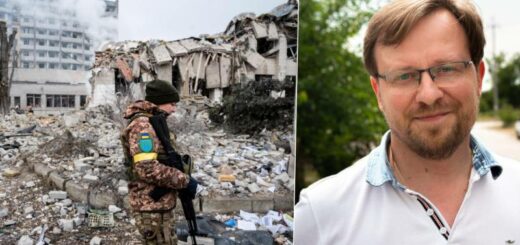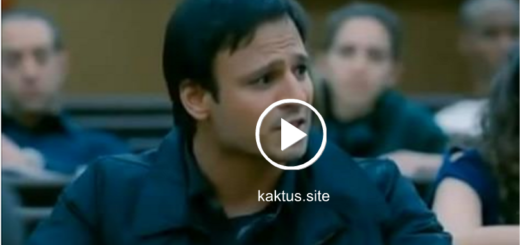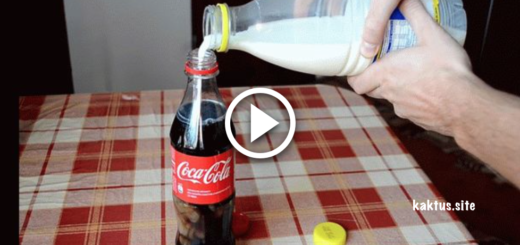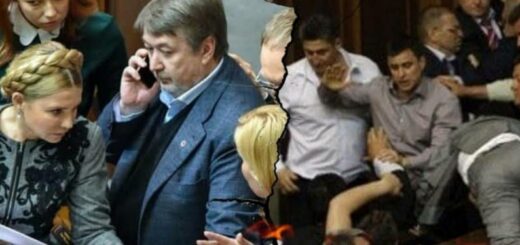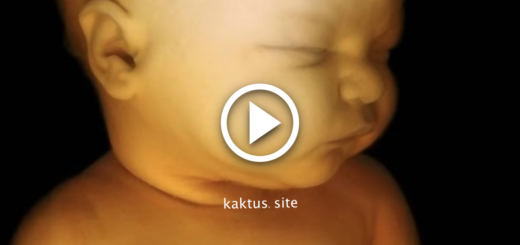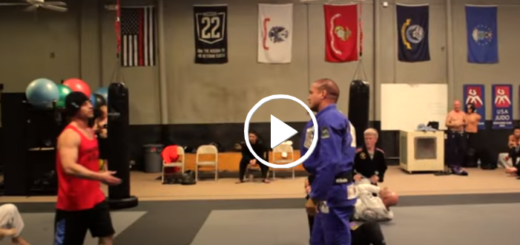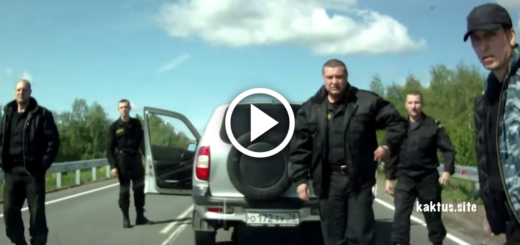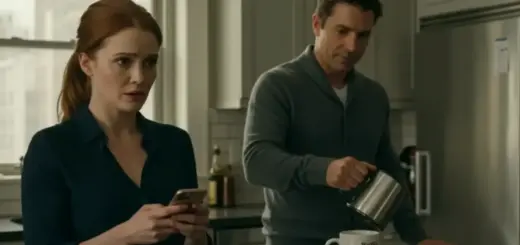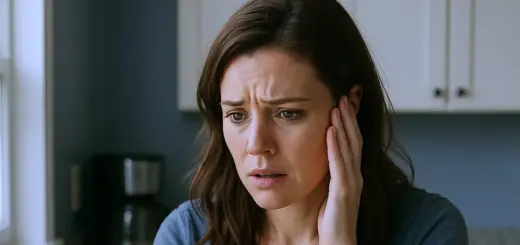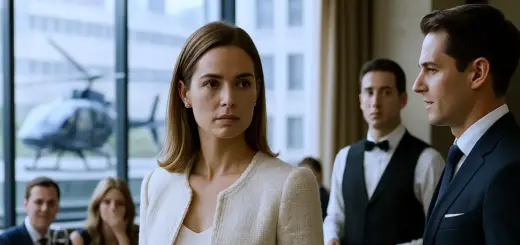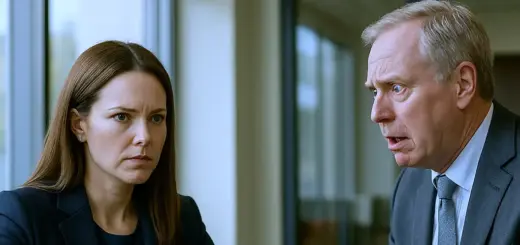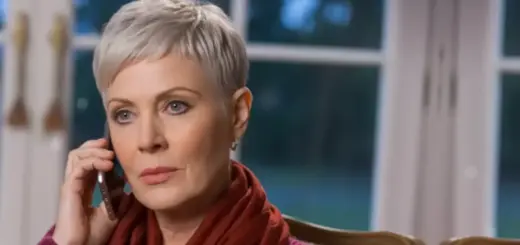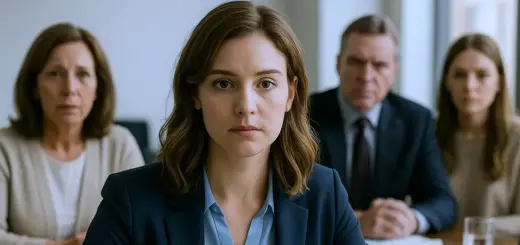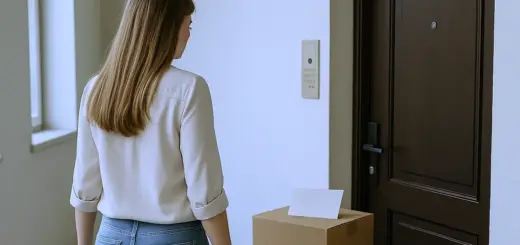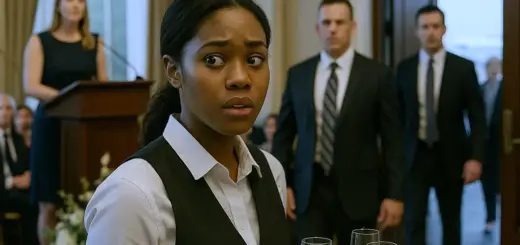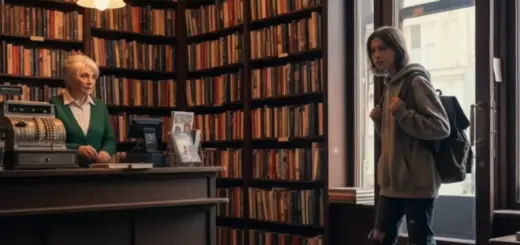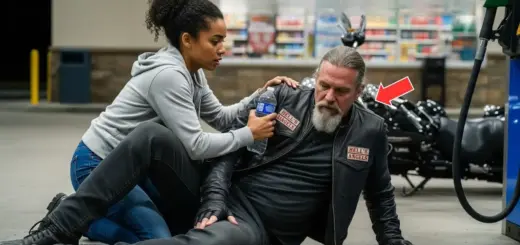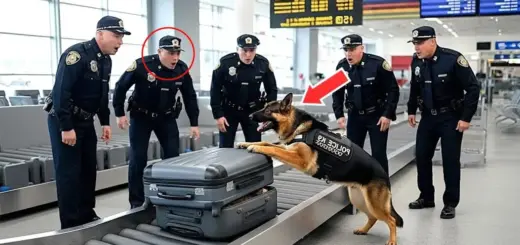But as the SUV got closer, I saw there were two people in the front seat. Albert was driving, and in the passenger seat was a silver-haired man in an expensive suit. James Carver.
The man who’d been pulling my son’s strings for a year. The man who’d laundered millions and killed to keep his secrets. And he was right behind us.
«Hold on,» Evans said, and turned hard onto a side street.
The SUV followed. Evans drove like he’d done this before. Fast but controlled. Taking turns that forced the heavier SUV to slow down.
But Albert knew these streets as well as Evans did. Better, maybe. He’d grown up here.
«They’re gaining,» Thornton said.
My phone buzzed again. Another text from Carver. «Diane? You’re making a mistake. Pull over. Let’s talk. I don’t want anyone to get hurt.»
Then another text. This one with an attachment. A photo.
It was Rachel, standing in my kitchen, holding something. It took me a moment to recognize it. The photograph from the beginning of all this. The one showing Robert and the Morses in 1992. And Rachel was holding a lighter to the corner.
«No,» I whispered.
Another text. «Your daughter-in-law is at your house right now, Diane. Cleaning up. Making sure there’s no evidence of any of this. Photographs, documents, personal items. All of it going up in smoke. Unless you stop and talk to me. Right now.»
«He’s burning my house,» I said, my voice breaking. «He’s burning everything.»
Thornton grabbed the phone and read the texts. His face went pale. «That’s a felony. Arson. Destruction of evidence.»
«He doesn’t care,» I shouted. «Don’t you understand? He’s already killed people. He’s not going to stop because it’s illegal.»
Evans took another hard turn. We were heading toward the highway now, toward escape. But escape to where? Carver had already proven he could find us. Could track us. Could destroy anything we left behind.
«We need to go to the FBI,» Thornton said. «Right now. It’s the only way you’ll be safe.»
«Boston is two hours away,» I said. «The farm will be ashes by then. Everything Robert left. Everything that proves what really happened. Gone.»
«You have the USB drive. You have the journal.»
«Copies. Robert said they’re copies. The originals are buried under the apple tree. And if Rachel burns down the house, they’ll bulldoze the property before I can get back there. They’ll find the evidence and destroy it. And all I’ll have is a USB drive that any lawyer can claim was fabricated.»
Another text. «Last chance, Diane. Pull over. Save your home. Save your son from making the worst mistake of his life. You have 30 seconds.»
I looked at the journal in my lap, at the USB drive, at Thornton’s frightened face. I thought about Rachel setting fire to my memories, to 40 years of my life. I thought about Albert, my son, driving behind us with a murderer beside him.
And I thought about Robert’s letter. «You’re stronger than you know, smarter than anyone ever gave you credit for.»
I had copies of the evidence. I had Thornton as a witness. I had William Morse’s statement and his investigator’s documentation. But most importantly, I had lived on that farm for 40 years. I knew every inch of it, every hiding place, every secret corner, every way in and out.
They might burn the house, but they’d have to find the evidence first. And I was the only one who knew exactly where to dig.
«Mr. Evans,» I said, my voice steady now. «Turn around. We’re going back to the farm.»
«Diane, that’s insane,» Thornton protested. «Carver is right behind us. He’s waiting for exactly that.»
«I know. But he’s made a mistake.» I looked at the lawyer, at his confused expression. «He thinks I’m a frightened old woman who will do anything to save her house. He doesn’t know who he’s dealing with.»
«And who’s he dealing with?»
I smiled and it was not a kind smile. «A woman who’s been running a hundred-acre farm by herself for two years, who can drive a tractor, birth a calf, and fix a fence in the dark, who survived 40 Vermont winters and buried a husband and rebuilt her life from nothing.»
I gripped the journal tighter. «He thinks age makes me weak. He’s about to learn otherwise.»
Evans met my eyes in the rearview mirror. «You’re serious.»
«Completely. Take me home, Mr. Evans. It’s time to end this.»
Behind us, Albert’s SUV was closing in. Ahead of us, the road split—one way toward Boston and safety, the other toward my farm and a final confrontation.
Evans’s hands tightened on the wheel. «Your funeral, lady.»
He turned toward the farm, and I began to plan.
We reached the farm at 2:47 a.m. The house was still standing, but smoke drifted from one of the upstairs windows. My bedroom, I realized with a sick feeling. Rachel was being methodical, burning room by room, giving herself time to search for anything incriminating before destroying it all.
Evans parked his BMW behind the barn, out of sight from the house. Albert’s SUV pulled into the driveway 30 seconds later. Through the gaps in the barn wood, I watched my son and James Carver get out, saw them conferring in low voices, their faces illuminated by the glow from the burning bedroom.
«They’re going to search the orchard,» I said. «Rachel’s inside burning evidence, but Carver won’t stop until he has the originals.»
«Then we need to get there first,» Thornton said. «Where exactly?»
«The largest apple tree, center of the orchard. But we can’t just walk out there, they’ll see us immediately.»
I looked around the barn, at the old equipment, the tools, the accumulated debris of 40 years of farm life. My mind worked quickly, assembling a plan from desperation and intimate knowledge of my own property.
«Mr. Evans,» I said nervously. «Maybe we should call the police now, the house is on fire. That’s enough to…»
«By the time they get here, Rachel will be gone and Carver will claim he was trying to help Albert check on his confused mother who left the stove on.» I shook my head. «No, we need the evidence first. Then we call the FBI, just like Robert said.»
I moved deeper into the barn, to the old tractor Robert had used before upgrading five years ago. It still ran. I’d kept it maintained out of sentiment. Next to it was the ancient manure spreader and a pile of equipment we’d used for the organic certification process.
«Here’s what we’re going to do,» I said.
Ten minutes later, I was driving the tractor toward the orchard, its headlights off, moving slowly enough that the engine noise blended with the night sounds. Thornton sat beside me, clutching a shovel. Evans had stayed behind to call 911, reporting the fire, not the rest of it. Not yet.
From the house, I heard Rachel’s voice calling out. «They’re here! I see a car behind the barn!»
Footsteps running. Albert and Carver heading toward where we’d been.
The tractor rumbled past the first row of apple trees. I knew this orchard like I knew my own hands. Every tree. Every slight rise in the ground. Every irrigation line. Even in the dark, I could navigate it perfectly.
The largest tree was in the exact center. A gnarled old giant that Robert and I had planted our first spring here. We’d been so young, so full of hope, certain that everything would grow strong and healthy.
Some things had. Some things had rotted from the inside.
I stopped the tractor and climbed down, my hip protesting after the earlier fall from the trellis. Thornton was already digging, his city lawyer hands clumsy with the shovel but determined.
Behind us, I heard the SUV’s engine roar to life. Headlights swept across the orchard.
«They know where we are,» Thornton gasped.
«Keep digging, we’re close.» I grabbed a second shovel from the tractor and joined him, driving the blade into the cold earth. Five feet down, Robert had said. Five feet seemed impossibly far when every second counted.
The SUV crashed through the orchard’s edge, tearing up the carefully maintained grass paths. It skidded to a stop 20 yards away, and Albert jumped out.
«Mom, stop!»
I kept digging, two feet down now. The earth was harder here, packed tight by years of settling.
Albert ran toward us, and I saw his face in the tractor’s reflected dashboard light, anguished, confused, caught between competing loyalties. «Mom, please, you don’t understand what you’re doing.»
«I understand perfectly,» I said, not stopping. «I understand that James Carver has been manipulating you for a year. I understand that your father made a terrible choice in 1992 to protect our family. And I understand that you were willing to lock me away rather than face the truth.»
«The truth?» Albert’s laugh was brittle. «The truth is Dad was a criminal. He blackmailed people, stole property, built our entire life on extortion.»
«He protected us,» I said. Three feet now. My arms ached, but I kept digging. «From men who would have killed us all. From a system that wouldn’t have cared about keeping a young family together. He made an impossible choice, and he’s been paying for it ever since.»
Carver had gotten out of the SUV now, moving more slowly, more carefully. He was smiling, I noticed. Actually smiling, as if this were all some amusing game.
«Diane,» he said, his voice smooth as silk. «You’ve led us on quite a chase, but it’s over now. You can’t dig fast enough. And even if you could, what then? You hand over evidence that will destroy your husband’s reputation, your son’s inheritance, your family’s name. For what? Revenge?»
«For justice,» I said. Four feet. The shovel hit something with a metallic clang.
Carver’s smile disappeared. «Albert, stop her. Now.»
Albert hesitated, looking between me and Carver. In that moment, I saw the little boy I’d raised. The one who’d cry over injured birds, who’d helped me nurse Robert through his final days. That boy was still in there, somewhere beneath the manipulation and fear.
«Albert,» I said softly, still digging around the metal object. «Your father left you a letter, too. It’s in the safe deposit box. Read it before you do anything else. Please.»
«There is no letter,» Carver snapped. «She’s lying. Diane, step away from the hole.»
He’d pulled out a gun. Small, dark, pointed directly at me.
Thornton froze mid-dig.
«Carver, put that away. You’re on camera.»
«What camera?» Carver laughed.
«The one I’m wearing.» Thornton tapped his lapel, where a small button camera was barely visible. «Recording everything. Audio and video, uploading to cloud storage in real time. Shoot anyone here, and you’ll be on film, committing murder. Your choice.»
I hadn’t known about the camera. Thornton had planned ahead better than I’d given him credit for.
Carver’s hand wavered, but the gun stayed up. «Clever. But here’s the thing about lawyers. You die just as easily as anyone else. And once you’re dead, I can destroy that camera and every copy you’ve made.»
«You won’t have time,» I said. I’d reached the metal box now, was prying it loose from the earth. «Because the FBI is already on their way. I texted Agent Sharon Morrison 20 minutes ago from Mr. Evans’s phone. She knows everything. The money laundering, the murders, all of it. They’ll be here in 30 minutes, maybe less.»
I hadn’t actually texted anyone. But Carver didn’t know that. His face went pale. «You’re bluffing.»
«Am I?» I pulled the metal box free and set it on the ground. It was locked, but I had the key. Another brass one, twin to the safe deposit box key that Robert had left in his note. «Your entire operation, documented in detail. Financial records going back 30 years. Audio recordings of your conversations with William Morse. Everything Robert collected before he made his deal.»
«Then we’ll destroy it before they arrive,» Carver said, and raised the gun higher. «Hand it over. Now.»
«No.» I stood up. The box clutched to my chest and faced him. An old woman in a nightgown covered in dirt, exhausted and terrified, but absolutely certain. «You’re going to prison, Mr. Carver, for murder, for money laundering, for everything you’ve done. And nothing you do here tonight will change that.»
«Mom,» Albert’s voice cracked. «Mom, please. He’ll kill you.»
«Then he’ll kill me,» I said simply. «But I won’t let him win. Not after what he did to your father. Not after he used you against me.»
In the distance, I heard sirens. Real ones this time. The fire department responding to Evans’s call. And behind them, maybe. Something else. More sirens. Closer.
Carver heard them too. His expression hardened. «Last chance, Diane.»
I looked at my son. At the man he’d become. Weak, where I’d hoped for strength. Fearful, where I’d dreamed of courage. But still, my son. Still salvageable, maybe, if he made the right choice now.
«Albert,» I said. «Your father loved you. Everything he did, every mistake he made was trying to give you a better life than he had. Don’t let this man, this murderer, make you complicit in my death. Don’t let him turn you into something you can’t come back from.»
Albert looked at me. Then at Carver. Then at the gun. And he made his choice.
He stepped between us, blocking Carver’s shot.
«No,» Albert said. His voice was steady now. Certain. «Put the gun down, James.»
«Get out of the way, Albert. Don’t be stupid.»
«I said no. It’s over. She’s right. The FBI is coming. You’re finished. But I don’t have to be finished with you. I can still choose who I am.»
Carver’s face twisted with rage. «You pathetic…»
The gunshot was deafeningly loud in the quiet orchard. But it wasn’t Carver’s gun.
It was Sheriff Daniels, appearing from behind the SUV with three deputies. His weapon pointed at Carver’s head.
«Drop it. Drop the weapon now.»
Carver stood frozen for a long moment, the gun still pointed at Albert’s back. Then, slowly, he lowered it and let it fall to the ground. Daniels kicked the weapon away and cuffed Carver with practiced efficiency.
«James Carver, you’re under arrest for attempted murder, criminal threatening, and conspiracy to commit arson. You have the right to remain…»
The Miranda rights faded into background noise as I sank to the ground. The metal box still clutched against my chest. My hands were shaking so badly I could barely hold it.
Albert knelt beside me, his face wet with tears. «Mom, I’m so sorry. I’m so, so sorry.»
I looked at him, really looked at him, and saw the boy I’d raised fighting to resurface through years of manipulation and fear and shame.
«You chose right,» I whispered. «At the last moment, you chose right. That’s what matters.»
Thornton helped me to my feet as more vehicles arrived, fire trucks, more police cars, and finally, a black sedan that screamed federal authority. A woman in her forties got out, badge already visible.
«Agent Sharon Morrison, FBI,» she said, approaching us. «I got a very interesting call about an hour ago from a lawyer named Gregory Evans. He said Diane Hartwell might need federal assistance.»
She looked at the metal box in my arms. «I assume that’s the evidence?»
I handed it to her, feeling the weight of 33 years lift from my shoulders. «Everything you need. Financial records, audio recordings, documentation of a money-laundering operation and three murders: William and Catherine Morse, and my husband, Robert Hartwell.»
Morrison took the box carefully, reverently. «We’ve been investigating Carver’s organization for two years. This might be exactly what we need to bring down the whole network.» She looked at Carver, now sitting in the back of a patrol car. «Well done, Mrs. Hartwell.»
Rachel was brought out of the house in handcuffs, her expensive coat covered in ash. She wouldn’t meet my eyes. The fire department was hosing down my bedroom, though the damage was extensive, but the house would survive. Could be repaired. Unlike some things.
I walked back to where Albert stood alone, watching everything with a shell-shocked expression.
«There’s a letter,» I told him. «In the safe deposit box in Burlington. Your father wrote it ten years ago, after he told you about the money. Read it. It explains everything. The choices he made, the reasons why, what he wanted for you.»
«I don’t deserve…»
«Read it anyway. And then decide who you want to be. But Albert?» I looked at him steadily. «If you choose to be the man James Carver tried to make you, if you choose greed and manipulation over truth and family, don’t come back to this farm. I’ll rebuild without you.»
«And if I choose better?»
I thought about it. About forgiveness and family and second chances. About how Robert had made terrible choices trying to protect the people he loved. And how those choices had rippled forward through decades.
«Then we’ll talk,» I said finally. «We’ll talk about what comes next. But the trust? That’s gone, Albert. You’ll have to earn that back if you can.»
He nodded, tears streaming down his face. «I understand.»
Agent Morrison approached again. «Mrs. Hartwell, I’ll need you to come to Boston tomorrow to give a formal statement. Can you do that?»
«Yes.»
«Good. And Mrs. Hartwell? William Morris was right about you. You are smarter than anyone gave you credit for.»
As the federal agents worked the scene, as the fire trucks finished their work, as my son stood alone with his choices, I walked back to the largest apple tree. The hole we’d dug gaped open like a wound in the earth.
Robert and I had planted this tree with such hope. We’d watered it through droughts, pruned it through winters, harvested its fruit every fall. We’d built our life around it, literally and figuratively. And all the while, beneath its roots, the evidence of our compromise had been waiting.
I knelt and touched the earth, thinking about the man I’d married, the choices he’d made, the price we’d all paid.
«I found it, Robert,» I whispered to the cold November night. «I found it, and I finished what you started. Rest now.»
The wind rustled through the bare branches above me, carrying the smell of smoke and the promise of dawn. It was over. Almost.
Three months later, I stood in the rebuilt bedroom, running my hand along the fresh paint. The room smelled of primer and new wood, scents of renewal, not ash.
Through the window, I could see the orchard, the trees just beginning to show the first hints of spring buds. The largest apple tree stood in the center, marked now by nothing more than a circle of fresh soil where we’d filled in the hole.
The evidence it had protected was in federal custody, being used to dismantle what Agent Morrison called one of the most sophisticated money-laundering operations in the Northeast.
James Carver was in prison awaiting trial on 17 counts, including three murders. The accelerated cancer that had killed Robert. Morrison had found the specialist Carver had hired, a doctor who’d since fled to Brazil but left behind enough documentation to prove what they’d done.
William and Catherine Morse’s car accident had been reinvestigated, revealing brake line tampering that the initial investigation had missed.
Rachel had taken a deal, agreeing to testify against Carver in exchange for a reduced sentence. She’d be out in five years, maybe less with good behavior. She’d never contacted me, never apologized. I didn’t expect she would.
The doorbell rang, pulling me from my thoughts. I descended the stairs slowly. My hips still ached on cold mornings, a permanent reminder of the night I’d climbed down the trellis.
I opened the door. Albert stood on the porch, holding a bakery box and looking uncertain. It was his fourth visit since that night. The first three had been brief, awkward, both of us tiptoeing around everything that had happened, but he kept coming back, kept trying, and that counted for something.
«Hi, Mom,» he said quietly. «I brought coffee cake, the kind Dad used to like.»
I stepped aside to let him in. «Thank you.»
We sat at the kitchen table, the same table where I’d found the photograph that had started everything. That photograph was now evidence in a federal case, along with so many other pieces of my life. But I had copies and memories, and slowly, I was rebuilding what had been taken.
«I read Dad’s letter,» Albert said after a long silence, «the one from the safe deposit box. I’ve read it probably 50 times now.»

